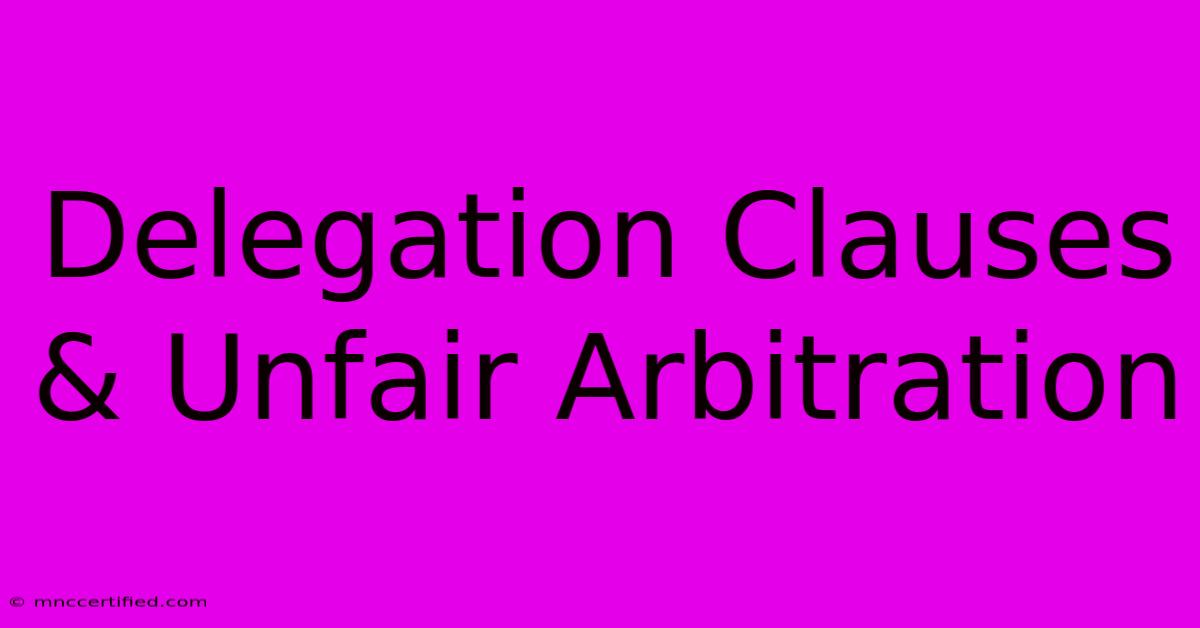Delegation Clauses & Unfair Arbitration

Table of Contents
Delegation Clauses & Unfair Arbitration: Navigating the Risks
Delegation clauses in arbitration agreements allow parties to entrust the arbitrator with the power to decide on the validity and enforceability of the entire agreement, including the arbitration clause itself. While seemingly efficient, these clauses can lead to unfair arbitration if not carefully drafted and applied, potentially undermining the very principles of fairness and due process. This article explores the intricacies of delegation clauses, highlights the potential for unfairness, and provides guidance on mitigating these risks.
Understanding Delegation Clauses
A delegation clause typically states that any challenge to the arbitration agreement itself, including claims of invalidity, will be decided by the arbitrator, not a court. This differs from a standard arbitration clause, where a court would initially determine the enforceability of the agreement before proceeding to arbitration. The key benefit proponents cite is streamlining the process; disputes about the arbitration itself are resolved swiftly by the chosen arbitrator, preventing costly and time-consuming preliminary court battles.
However, this efficiency comes with significant risks. The potential for bias and lack of impartiality inherent in entrusting the arbitrator with such extensive power is a major concern. Imagine a situation where a party challenges the validity of the contract containing the arbitration clause, arguing it was procured through duress or misrepresentation. If the arbitrator dismisses this challenge, the party may be effectively forced into an unfair arbitration process.
Potential for Abuse
The inherent power imbalance created by a delegation clause opens the door to potential abuse. A stronger party might leverage this clause to effectively shut down legitimate challenges to the contract or the arbitration process itself. This creates a situation where:
- Procedural unfairness: The arbitrator, tasked with determining the validity of the entire agreement, might lack the necessary independence to impartially judge the matter.
- Substantive unfairness: Even if the arbitrator is impartial, the lack of judicial oversight can lead to outcomes that are substantively unfair to the weaker party.
- Limited recourse: Challenging the arbitrator's decision on the validity of the clause itself becomes significantly more difficult, limiting avenues for redress.
Mitigating the Risks of Unfair Arbitration
While delegation clauses can offer efficiency, careful drafting and considerations are crucial to minimize the risk of unfair arbitration. Several strategies can be employed:
- Transparency and clarity: The clause should be explicit, unambiguous, and easily understandable to both parties. Vague language can lead to disputes and potential manipulation.
- Independent arbitrator selection: Ensuring a neutral and impartial arbitrator selection process is paramount. Consider utilizing reputable arbitration institutions with established processes for arbitrator selection and challenge.
- Due process safeguards: Incorporate provisions that ensure fair procedures, such as the right to present evidence, cross-examine witnesses, and challenge the arbitrator's jurisdiction.
- Limited scope of delegation: Carefully define the scope of the arbitrator's authority to decide on the validity of the arbitration clause, avoiding overly broad language. Consider specifying the grounds for challenge that fall within the arbitrator's purview.
- Judicial review: Though limited, certain jurisdictions allow for limited judicial review of the arbitrator's decision on the validity of the arbitration clause, particularly if there's evidence of manifest error or bias.
Conclusion: Striking a Balance
Delegation clauses, when properly structured and implemented, can streamline the dispute resolution process. However, the potential for unfair arbitration remains a significant concern. By emphasizing transparency, impartial arbitrator selection, due process safeguards, and carefully limiting the scope of delegation, parties can mitigate these risks and achieve a fair and efficient resolution of their disputes. Legal counsel specializing in arbitration is crucial in navigating the complexities of these clauses and ensuring a fair outcome. Ignoring these precautions can lead to significant disadvantages, potentially rendering the entire arbitration process fundamentally flawed. Careful consideration and proactive mitigation strategies are essential to harness the benefits of delegation clauses without sacrificing fairness.

Thank you for visiting our website wich cover about Delegation Clauses & Unfair Arbitration. We hope the information provided has been useful to you. Feel free to contact us if you have any questions or need further assistance. See you next time and dont miss to bookmark.
Featured Posts
-
2024 Mega Millions Nov 26 Lottery Results
Nov 27, 2024
-
Barclays Cuts Mortgage Rates Metro Rental Cap Removed
Nov 27, 2024
-
Uk Ministers Barred From Russia
Nov 27, 2024
-
Rare Earths American Firm Unveils Record
Nov 27, 2024
-
Wildlife Photographer Of The Year Vote
Nov 27, 2024